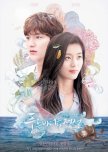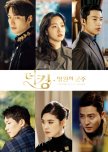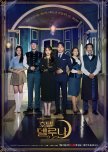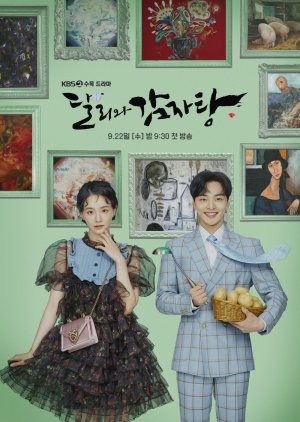






Both start off with two people with totally different believes, lifestyles and overal world views. After their strange first meeting in which the male lead takes a notices of the female lead (and he seems to be the first one quite smitten with her) the main leads start interacting at their workplace.
Both main leads start living together (in the same building, but different floors) and due to their communication solve all of their problems.
Both dramas have good communication between the mains (mainly, but not only throught conversations).
Both main leads start living together (in the same building, but different floors) and due to their communication solve all of their problems.
Both dramas have good communication between the mains (mainly, but not only throught conversations).

Both have a practical, just trying to make a living , a bit of a con artist/unscrupulous ML and an eccentric, whimsical always sticking her foot in it FL.
Conspiracy elements, and family elements overlap as well.
Legend of the Blue Sea is a bit more even in tone and a wee bit more of a fantasy element . . .
Conspiracy elements, and family elements overlap as well.
Legend of the Blue Sea is a bit more even in tone and a wee bit more of a fantasy element . . .

Both have the opposite attracts romantic comedy mixed with a bit of a catch-the-cultprit/murder-mistery.
While the genders in both hero and heroine are reversed they involve one main lead, which is calm, seemingly mature and well-educated person and another one, which is loud and lacks basic culture. Surprisingly they both make great couples.
Both leads (genders reversed) are surprisingly successful in their work even though their lack of education and do it from a long time so that they help their family.
While the genders in both hero and heroine are reversed they involve one main lead, which is calm, seemingly mature and well-educated person and another one, which is loud and lacks basic culture. Surprisingly they both make great couples.
Both leads (genders reversed) are surprisingly successful in their work even though their lack of education and do it from a long time so that they help their family.


Though the genres are not the same, there are some similarities:
- both male leads initially come off as ridiculously cocky (one is a king who's handsome and he knows it, while the other is an uncultured nouveau riche) but they are very smart when things get serious and very professional when it comes to work.
- both female leads are strong and independent from start to finish in their own ways: in TKEM, she's a tough fighter (literary) while Dali is elegant and classy.
- both couples have amazing chemistry and a nice supportive relationship. They each accepted their partners as they are despite their polar-opposite personalities.
All-around, Dali is a better written story because it has less plotholes and product placement, and is more grounded in reality. However, TKEM has way better production and cinematography and much bigger stakes making everything feel epic.
I highly recommend both.
- both male leads initially come off as ridiculously cocky (one is a king who's handsome and he knows it, while the other is an uncultured nouveau riche) but they are very smart when things get serious and very professional when it comes to work.
- both female leads are strong and independent from start to finish in their own ways: in TKEM, she's a tough fighter (literary) while Dali is elegant and classy.
- both couples have amazing chemistry and a nice supportive relationship. They each accepted their partners as they are despite their polar-opposite personalities.
All-around, Dali is a better written story because it has less plotholes and product placement, and is more grounded in reality. However, TKEM has way better production and cinematography and much bigger stakes making everything feel epic.
I highly recommend both.
































